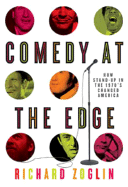

Starting with Lenny Bruce, the progenitor of the 1970s style of stand-up, Zoglin examines the careers, source material and personal lives of the funniest men (and a few women) to ever grab a microphone. Among the luminaries here: George Carlin, Robert Klein, Albert Brooks, Richard Lewis, Steve Martin, Robin Williams, Joan Rivers and Jerry Seinfeld. The names alone are enough to inspire a chuckle in the throats of anyone who has watched television in the last 30 years (and for those who remember Saturday Night Live in the '70s, this book is a time capsule in miniature). Zoglin also devotes time to the patrons of '70s stand-up, including Johnny Carson, the Smothers Brothers and Mitzi Shore, owner of the Comedy Store in Los Angeles.
Often using their own words, Zoglin shows how these comics combined current affairs with intimate personal experience to mine laughs and create biting social commentary in the process. Each comic found his or her own niche within this context: Pryor addressed race, Carlin railed against the status quo, Brooks lambasted show business and Williams pushed the limits of improvisational comedy to its extremes. Not surprisingly, given the confessional nature of their acts, the funniest, sharpest comics often drew from deep wells of inner turmoil, perhaps none as much as Richard Pryor, whose train wreck of a life was as tragic as his material was brilliant.
By the time Jerry Seinfeld found superstardom, Zoglin points out, comedy's edge had softened due in large part to how difficult it had become to shock an audience inured to sex, drugs and cynicism. A case in point: there are now only four of Carlin's "Seven Words You Can't Say on Television" that would still raise an eyebrow--and that's on network.
There is so much to recommend about this compelling and expertly written book. The author's note alone, where Zoglin describes when, where and how the comics spoke with him and about each other, is worth the cover price. The nostalgia--for an era of comedy that produced a galaxy of stars, many of whom still shine--is free.--Debra Ginsberg

